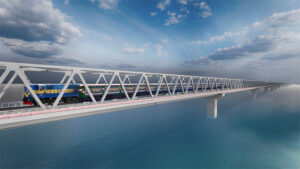 AHM Masum Billah: The government is constructing a new railway bridge with advanced technology over the Jamuna River to add speed to the communication system in the northern region of the country. The construction of this dual gauge (double track) bridge will open the doors of new economic possibilities in the country. Project officials, engineers and technicians are working relentlessly to finish the work within the stipulated time of August 2024. Soon the country’s rail communication system will be upgraded to a new level with the construction of Padma Rail Bridge along with Bangabandhu Rail Bridge in 2024. As a part of plan of building Sonar Bangla, the government has taken a comprehensive plan to bring the entire country under the rail network to ensure safe and fast communication facilities for the people.
AHM Masum Billah: The government is constructing a new railway bridge with advanced technology over the Jamuna River to add speed to the communication system in the northern region of the country. The construction of this dual gauge (double track) bridge will open the doors of new economic possibilities in the country. Project officials, engineers and technicians are working relentlessly to finish the work within the stipulated time of August 2024. Soon the country’s rail communication system will be upgraded to a new level with the construction of Padma Rail Bridge along with Bangabandhu Rail Bridge in 2024. As a part of plan of building Sonar Bangla, the government has taken a comprehensive plan to bring the entire country under the rail network to ensure safe and fast communication facilities for the people.
Bangabandhu Rail Bridge will have some amazing technological feats that have not been used so far in the country. The foundation of this bridge has adopted Japanese technology, which is rarely used outside Japan. Besides, special materials will be used to bring down the wear of the rail lines caused the friction of the wheels. As a result, the lines will demand less maintenance and will be operational for a long period, may be up to thirty years.
Besides, a special technology is being used in the joints of the bridge to reduce the weight of the bridge. The railway bridge will be made of weathering steel. The existing bridges in the country require painting every two to three years. But the new Bangabandhu Rail Bridge will not need painting. This will shrink down the maintenance cost of this bridge to almost zero. The bridge will be made in such a material that it will not rust even in the next 100 years. Besides, the color of the girders of the bridge will switch with the change of weather. So far, no rail bridge in the country is not featured with such a high technology.
Bangabandhu Rail Bridge is being built with 50 pillars and 49 spans. Construction of this 4 point 8 km long bridge is being implemented under the joint funding of the Governments of Bangladesh and Japan. According to the project officials once the bridge is operational, at least 88 trains per day will be able to run on its double track at a speed of 100 to 120 kmph.
The project also includes construction of viaduct at both ends, 7point 667 km of railway approach embankment and construction of a total of about 30 km of railway line with loops and sidings. Besides, new station buildings on the east and west sides of the bridge, yard remodeling and railway bridge museum will be constructed under this project. Other works under this project include river administrations and rehabilitation works.
The railway connectivity of the capital Dhaka with the north and south-western regions country commenced in 1998 through the Bangabandhu Bridge. However, in 2008, due to cracks in the bridge, the speed of the train was reduced. As a result, now about 38 trains per day can cross at a speed of just 20 km per hour causing wastage of time of the passengers and disruption of schedule of railway system. To address this problem the government has decided to construct this new Bangabandhu Rail Bridge with modern technology at a cost of 16 thousand 780 crore taka. Prime Minister Sheikh Hasina laid its foundation stone on November 29, 2020.
This new bridge will take the railway communication system of the country to a new level. People from northern region can do their professional activities by commuting easily from home to the capital by rail. This new railway bridge construction will create opportunities for opening new routes in the future. Since this bridge will have two railway lines no train will have to wait to cross the river. Trains with multiple locomotives (used in freight trains) will be able to move over this bridge. Freight and passenger trains of any weight can run over it.
Meanwhile, on the west side of the bridge, Sirajganj Economic Zone and BSCIC Industrial Park are being developed. The new bridge will be key tool for rapid economic activities in these industrial areas. Agricultural and industrial products can be transported directly from the northern region to the entire country, even in abroad by train at a low cost.
The Government of Bangladesh has a plan to join the country in the Trans Asian Railway Network. This bridge will be helpful to take part in that connection. Passengers and goods can be transported directly from Dhaka to India and other Asian destinations and vice versa by train at reduced rate. We are hopeful that Bangabandhu Rail Bridge will be instrumental in achieving the dream of building a developed country by 2041.
Writer: AHM Masum Billah is the senior Information Officer of PID.





